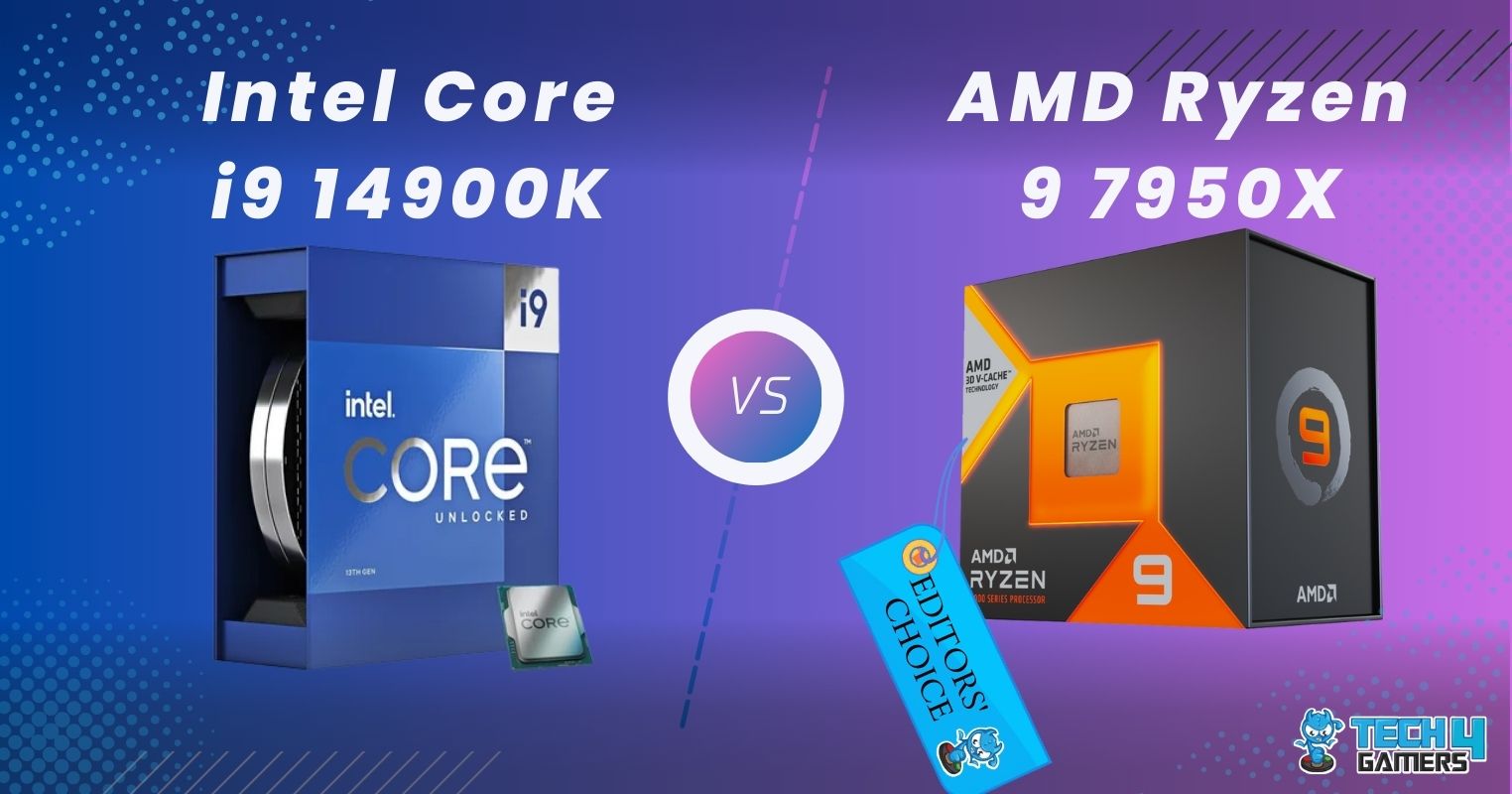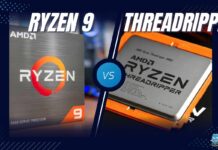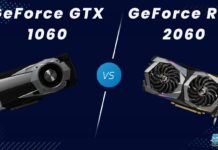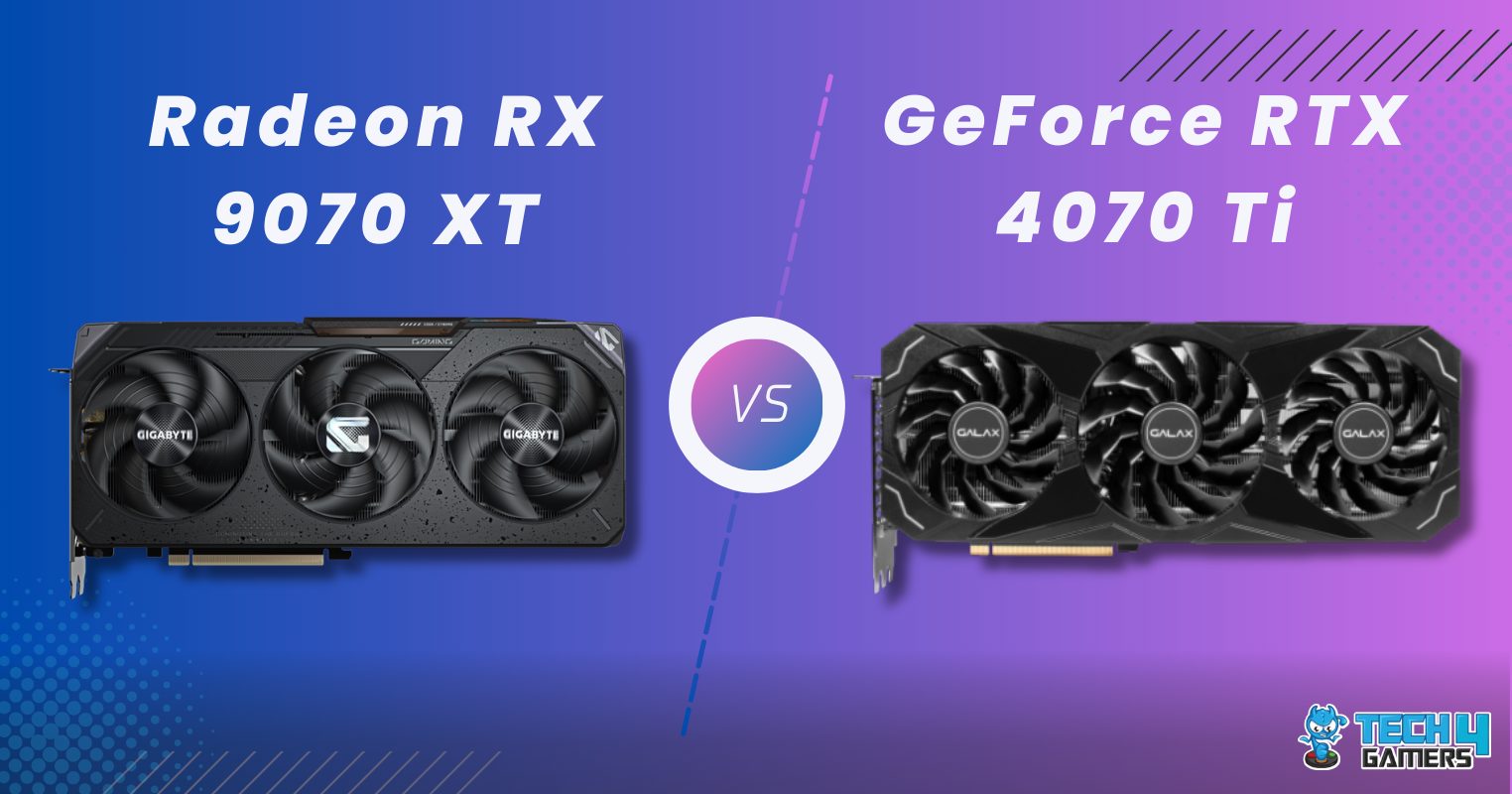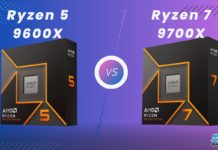AMD Ryzen 9 7950X
Rated: 8.5/10
Intel Core i9 14900K
Rated: 8/10
Pros & Cons
| Pros | Cons | |
|---|---|---|
| Ryzen 9 7950X | ✅Excellent power efficiency ✅Slightly higher performance | ❌More expensive platform ❌Cannot use DDR4 RAM |
| Core i9 14900K | ✅Uses a cross compatiable platform ✅Offers the choice between DDR5 and DDR4 RAM | ❌Very old manufacuring process ❌Very similar to it's large generation counterpart |
Key Takeaways
- In our testing at 1080p, the Ryzen 9 7950X led by only 2% over the Intel Core i9 14900K in terms of average framerate and lost by around 2% in terms of 1% lows.
- Our tests also showed the Ryzen 9 7950X consumes around 14% less power than the Core i9 14900K.
- At the time of writing this comparison, the 7950X is around $60 cheaper than the Core i9.
- The Core i9 14900K is best for people with existing Intel setups looking to update, whereas the Ryzen 9 is better for people looking for a more balanced, fairly priced processor.
Specifications Sheet
| Feature | Core i9 14900K | Ryzen 9 7950X |
|---|---|---|
| Core Architecture | big.LITTLE (Hybrid) | Normal |
| Hyperthreading | Yes | Yes |
| Overclocking | Yes | Yes |
| Max Memory | 192GB | 128GB |
| PL1 TDP | 125W | 175W |
| Chip Design | Monolithic | Chiplet |
| Best Coolers | Best CPU Coolers For i9 14900K | - |
| Best RAM | Best RAM for i9 14900K | Best RAM for Ryzen 9 7950X |
| Best Motherboards | Best Motherboards For i9 14900K | Best Motherboards For Ryzen 9 7950X |
Architectural Differences
- Core Count: Both the Core i9 14900K and Ryzen 9 7950X use 32 threads, though they both have different approaches to getting there. The Core i9 14900K uses 8 efficiency cores and 8 performance cores, whereas the Ryzen 9 7950X uses 16 performance cores exclusively.
- Clock Speed: The performance cores of the Core i9 have a base clock of 3.2GHz, with a boost of up to 6GHz. The Ryzen 9 7950X, however, has a base clock of 4.5GHz, with a boost of up to 5.7GHz.
- Process Node: The i9 uses a much older 10nm processing node, whereas the Ryzen gains power and efficiency from its newer 5nm manufacturing process.
- Memory: The 14900K supports both DDR5 and DDR4 memory, whereas the Ryzen 9 supports only DDR5 memory, eliminating the option of using older and cheaper DDR4 RAM.
- L3 Cache: The AMD chip has 64MB of L3 cache, double that of the Core i9 14900K’s 32MB cache.
- TDP: The 14900K is rated for a TDP of up to 253 watts, whereas the Ryzen 9 7950X goes up to a TDP of 230 watts.
One might think that the Core i9 14900K is more powerful because of its higher core count, but that’s not the case here. Core i9 14900K performs slightly less than the Ryzen 9 7950X while being much more power inefficient.
– Shehryar Khan
The top-end market of CPUs has been accused of being stale for a long time by tech enthusiasts, with both major chip manufacturers not showing any signs of improvement. The Core i9 14900K vs Ryzen 9 7950X comparison will challenge the truth of this claim, so ride along to see the conclusion of this battle of the behemoths.
Gaming Benchmarks – 1080p
Now the technical details have been laid out before us, this part of the Core i9 14900K vs Ryzen 9 7950X comparison will detail the performance of these chips in different gaming scenarios. To do this, we built a special test bench, the specifications of which are listed below:
Gaming Rig
- OS: Windows 11
- GPU: RTX 4090
- RAM: XPG Lancer RGB 32GB 7200MT/s DDR5
- SSD: XPG GAMMIX S70 BLADE 2TB NVMe
- CPU Cooler: Arctic Liquid Freezer II 420 – AIO Water Cooler
- PSU: ENERMAX REVOLUTION D.F. X 1050W
Rainbow Six Siege

- Kicking off our comparison, the Core i9 had an average framerate of around 656 FPS in Rainbow Six Siege, which was around 6% lower than the 694 FPS average of the Ryzen.
- The 1% lows fell around the same framerate in this game, with the Ryzen getting around 429 FPS, whereas the Core i9 had minimums of around 428 FPS.
F1 23

- The average framerate of the Core i9 was around 423 FPS in F1 23, while the Ryzen had a 1.6% higher framerate on average with a framerate of 430 FPS. At such a high framerate, both processors essentially feel the same, but the difference is still there.
- The 1% lows flipped the table, with the i9 getting lows of around 279 FPS, while the Ryzen had ever so slightly lower minimums of around 276 FPS.
Baldur’s Gate

- Moving up to a more GPU-demanding game, our test of Baldur’s Gate revealed a larger performance difference between our two competitors. The Core i9 14900K had an average framerate of 110 FPS, whereas the Ryzen 9 7950X was around 15% slower, with an average framerate of only 95 FPS.
- The minimum framerates of the i9 dropped to around 69 FPS, whereas the Ryzen 9 7950X had 1% lows of around 58 FPS.
Cyberpunk 2077

- Finally, Cyberpunk 2077 evened things out with a win for the Core i9, with an average framerate of 168 FPS, only a frame higher than the 167 FPS average of the 7950X.
- The Ryzen had 1% lows of around 109 FPS, while the Core i9 14900K was significantly smoother with a framerate of around 117 FPS.
Overall Gaming Performance

Average FPS
The performance was neck and neck between the two CPUs, with the Ryzen 9 7900X edging out a slight victory. It had an average framerate of around 347 FPS, whereas the Core i9 14900K averaged a framerate of around 340 FPS in the four games we tested. This came out to a 2% victory for the Ryzen.
Here is a small glimpse of the gameplay that we conducted to get the mentioned results.
1% Lows
The tables were turned in terms of 1% lows, with the Ryzen 9 7950X getting a median of 218 FPS, around 2% slower than the 224 FPS median of our Intel chip. Though not noticeable at such high framerates, the higher 1% lows of the Core i9 14900K can greatly reduce stutters.
Winner: Intel's Core i9 14900K
Gaming Power Consumption
It is important to keep in mind the power draw of these chips while evaluating their performance to keep them in a frame of reference.
| Games | Core i9 14900K (W) | Ryzen 9 7950X (W) |
|---|---|---|
| Rainbow Six Siege | 123 | 105 |
| F1 23 | 115 | 99 |
| Baldur's Gate | 135 | 116 |
| Cyberpunk 2077 | 138 | 119 |
| Average Power Draw | 128 | 110 |
| Winner: AMD's Ryzen 9 7950X | ||
The table above shows that the Ryzen consumes around 14% less power than the Intel CPU, which is very impressive considering its slightly higher performance as well. This paints the Ryzen 9 7950X as a power-efficient processor, at least compared to the power hog that is the 14900K.
Temperatures
Overheating issues can arise in such power processors, which is why we think it is necessary to discuss the peak temperatures of the Core i9 14900K vs Ryzen 9 7950X in the tests we conducted.
| Games | Core i9 14900K (°C) | Ryzen 9 7950X (°C) |
|---|---|---|
| Rainbow Six Siege | 65 | 57 |
| F1 23 | 62 | 61 |
| Baldur's Gate | 59 | 54 |
| Cyberpunk 2077 | 66 | 59 |
| Average Temperature Statistics | 63 | 58 |
| Winner: AMD's Ryzen 9 7950X | ||
The temperatures were around 63°C for the Core i9, whereas the Ryzen was significantly cooler at around 58°C. Keep in mind that both of these temperatures are well within the thermal limits of these processors and will not harm your gaming experience in any meaningful way.
Price And Value
| CPU | MSRP | Current Price |
|---|---|---|
| Core i9 14900K | 💲589 | 💲589 |
| Ryzen 9 7900X | 💲699 | 💲531 |
| Price Difference | 18% | 11% |
The Core i9 14900K has an MSRP of around $589 and goes for around the same price due to its somewhat recent launch at the time of writing this article. The Ryzen 9 7950X, however, has an MSRP of $699 but is being sold for around $569, giving slightly better value than the Core i9. Some places, like Amazon, list it for even cheaper, at around $531.
What We Recommend
Core i9 14900K: Though it offers a little less power and a slightly higher cost than the Ryzen 9 7950X, the Core i9 14900K could be a worthwhile investment if you have a working 12th or 13th-gen Intel platform, as the cross-compatibility of this chip can make it a simple drop-in upgrade.
Ryzen 9 7950X: If you want a little more innovation in the processor you buy, go for the AMD alternative. It gives plenty of power while not sacrificing power efficiency or cost-effectiveness.
At the end of the day, your existing setup and brand loyalty will be the biggest factor in deciding between the Core i9 14900K vs Ryzen 9 7950X as they have very similar performance.
Frequently Asked Questions
The core i9 14900K uses the LGA 1700 socket that Intel has kept in use since the 12th-generation processors.
The Ryzen 9 7950X, like the rest of the Ryzen 7000 series of chips uses the new AM5 socket, which has been changed for the first time since the inception of the Ryzen series of processors.
Yes, both the Core i9 14900K and the Ryzen 9 7950X have decent onboard graphics.
More From Core i9 14900K
More From Ryzen 9 7950X
Thank you! Please share your positive feedback. 🔋
How could we improve this post? Please Help us. 😔
[Comparisons Expert]
Shehryar Khan, a seasoned PC hardware expert, brings over three years of extensive experience and a deep passion for the world of technology. With a love for building PCs and a genuine enthusiasm for exploring the latest advancements in components, his expertise shines through his work and dedication towards this field. Currently, Shehryar is rocking a custom loop setup for his built.
Get In Touch: shehryar@tech4gamers.com


 Threads
Threads